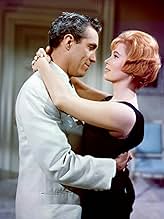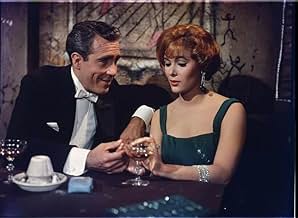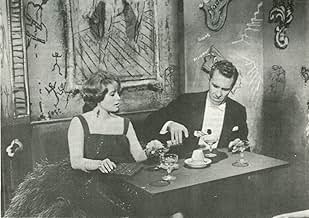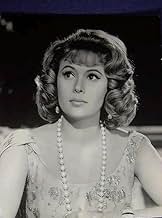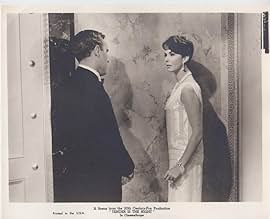Ajouter une intrigue dans votre langueA Psychiatrist and his life with a patient he helped to recover.A Psychiatrist and his life with a patient he helped to recover.A Psychiatrist and his life with a patient he helped to recover.
- Réalisation
- Scénario
- Casting principal
- Nommé pour 1 Oscar
- 1 victoire et 1 nomination au total
Jason Robards
- Dr. Richard 'Dick' Diver
- (as Jason Robards Jr.)
Avis à la une
Despite David O. Selznick's omnipresence whenever his wife was involved in a film even if it wasn't his own, director Henry King managed to make a fine film adaption of F. Scott Fitzgerald's celebrated autobiographical novel, Tender Is The Night. Jennifer Jones and Jason Robards, Jr. are nothing short of wonderful in the leads.
A lot of the personal lives of both the leads went into roles of Nicole and Dick Diver. Jennifer Jones saw enough tragedy in her life for about five people and saw the inside of mental institutions a few times while on the mortal coil. And Jason Robards love of the grape was also well known.
Robards purportedly is Fitzgerald himself who fell in love with a high flying millionairess Zelda Sayre and the easy living he became accustomed to sapped his creative energy. In this work Robards is a psychiatrist who forgot professional ethics and fell in love with his patient. Zelda Fitzgerald also saw the inside of an asylum, but no one ever affected a lasting cure for her.
The two live in real luxury as American expatriates in Europe and 20th Century Fox spent no small expense turning the locations in Europe like the Riviera, Paris, and Zurich into what they looked like in the Twenties. Bernard Herrmann wrote a musical score that interwove more melodies from that era than I could count.
Robards falls in love with the beautiful Jones as he helps bring her out of her mental illness. The Code was as omnipresent as David O. Selznick and the barest hint of the cause of her illness was made because talk of incest was still a big taboo. It would take Chinatown more than ten years later to bring that sin into the open on screen. One thing that wasn't included from the novel was a theme of miscegenation as well in deference to our Southern audiences still not the beneficiaries of the Civil Rights revolution. Fascinating as to what was considered worse by Hollywood box office standards in 1962.
Joan Fontaine plays Jennifer's older sister and custodian of the family legacy. The father was one of those robber baron tycoons who committed suicide and of course it was that and the incest that drove Jones to her illness. Fontaine totally misreads Robards as a fortune hunter, but since he's pried the family's dirty secret from Jennifer's mind, better to have him in the family. Because of Jennifer's illness Fontaine controls the family purse strings.
Loving Jones and at the same time resentful of being tied financially to her, Robards loses professional detachment. This was something he should have learned from his mentor Paul Lukas who has a small part. Tender Is The Night is an object lesson about not getting involved with a patient personally.
Tom Ewell as a Broadway composer who has lost his muse in alcohol has a good role as a kind of hanger on to the Robards/Jones party world. He's a good ornament to have at a party. I believe his role might be based on Vincent Youmans who gave up his career to both tuberculosis and to a drinking problem. The theme song by Sammy Fain and Paul Francis Webster also serves as a symbol of a lot of unfinished lives. Ewell keeps playing the melody and he can't complete it. When someone else does he takes it all wrong and tragedy ensues.
The title song Tender Is The Night is one of my favorite movie melodies. I have a recording of it by Tony Martin and it received the only Academy Award nomination the film had. The song lost to the title song of another fine film, The Days Of Wine And Roses. Personally I like Tender Is The Night much better.
Tender Is The Night was the farewell directing assignment for Henry King who in his long career directed some of the best films 20th Century Fox ever made. For some reason he's not considered at the very top of his profession and I think it's because he was contracted to one studio and stayed there. I think the reasoning is that if you're the very best you can go from studio to studio and you must be the best if everyone wants you. A contract director like King just gets assignments. But King always did his films with a certain amount elegance to them and so what if he toiled only at one dream factory. Guys like King and Woody Van Dyke and Clarence Brown at MGM always get a short shrift when discussing directors.
Fitzgerald purists will not be crazy about Tender Is The Night, but I think it holds up very well almost fifty years after its first release. Really top flight entertainment.
A lot of the personal lives of both the leads went into roles of Nicole and Dick Diver. Jennifer Jones saw enough tragedy in her life for about five people and saw the inside of mental institutions a few times while on the mortal coil. And Jason Robards love of the grape was also well known.
Robards purportedly is Fitzgerald himself who fell in love with a high flying millionairess Zelda Sayre and the easy living he became accustomed to sapped his creative energy. In this work Robards is a psychiatrist who forgot professional ethics and fell in love with his patient. Zelda Fitzgerald also saw the inside of an asylum, but no one ever affected a lasting cure for her.
The two live in real luxury as American expatriates in Europe and 20th Century Fox spent no small expense turning the locations in Europe like the Riviera, Paris, and Zurich into what they looked like in the Twenties. Bernard Herrmann wrote a musical score that interwove more melodies from that era than I could count.
Robards falls in love with the beautiful Jones as he helps bring her out of her mental illness. The Code was as omnipresent as David O. Selznick and the barest hint of the cause of her illness was made because talk of incest was still a big taboo. It would take Chinatown more than ten years later to bring that sin into the open on screen. One thing that wasn't included from the novel was a theme of miscegenation as well in deference to our Southern audiences still not the beneficiaries of the Civil Rights revolution. Fascinating as to what was considered worse by Hollywood box office standards in 1962.
Joan Fontaine plays Jennifer's older sister and custodian of the family legacy. The father was one of those robber baron tycoons who committed suicide and of course it was that and the incest that drove Jones to her illness. Fontaine totally misreads Robards as a fortune hunter, but since he's pried the family's dirty secret from Jennifer's mind, better to have him in the family. Because of Jennifer's illness Fontaine controls the family purse strings.
Loving Jones and at the same time resentful of being tied financially to her, Robards loses professional detachment. This was something he should have learned from his mentor Paul Lukas who has a small part. Tender Is The Night is an object lesson about not getting involved with a patient personally.
Tom Ewell as a Broadway composer who has lost his muse in alcohol has a good role as a kind of hanger on to the Robards/Jones party world. He's a good ornament to have at a party. I believe his role might be based on Vincent Youmans who gave up his career to both tuberculosis and to a drinking problem. The theme song by Sammy Fain and Paul Francis Webster also serves as a symbol of a lot of unfinished lives. Ewell keeps playing the melody and he can't complete it. When someone else does he takes it all wrong and tragedy ensues.
The title song Tender Is The Night is one of my favorite movie melodies. I have a recording of it by Tony Martin and it received the only Academy Award nomination the film had. The song lost to the title song of another fine film, The Days Of Wine And Roses. Personally I like Tender Is The Night much better.
Tender Is The Night was the farewell directing assignment for Henry King who in his long career directed some of the best films 20th Century Fox ever made. For some reason he's not considered at the very top of his profession and I think it's because he was contracted to one studio and stayed there. I think the reasoning is that if you're the very best you can go from studio to studio and you must be the best if everyone wants you. A contract director like King just gets assignments. But King always did his films with a certain amount elegance to them and so what if he toiled only at one dream factory. Guys like King and Woody Van Dyke and Clarence Brown at MGM always get a short shrift when discussing directors.
Fitzgerald purists will not be crazy about Tender Is The Night, but I think it holds up very well almost fifty years after its first release. Really top flight entertainment.
The great 20th century American novelists all created books that were difficult to transfer to the big screen successfully. Hollywood had better luck adapting the short stories of Faulkner and Hemingway to the motion picture medium than with their master works. Fitzgerald was no exception. None of his masterpieces was a total success when rewritten as screenplays, even when directed by such skilled artisans as Henry King. Only John Steinbeck's works were ready-made for media exchanges. But who would place him on the same creative sphere as Faulkner, Hemingway, and Fitzgerald? "Tender is the Night" has its moments of greatness, in particular toward the end and who can fault the acting of such a stellar cast.
One distraction for this viewer was the failure of the director and cinematographer to capture on film the essence of The Jazz Age the way Fitzgerald did in his novel. This version of "Tender is the Night" has the 1960's written all over it from the clothes worn to a jet-set aura rather than the Lost Generation expatriate ambiance of the Fitzgerald masterpiece. Even the music is more 1930's swing than 1920's jazz. The only saving grace in the music department is the original score provided by virtuoso composer Bernard Herrmann.
All that remains of Fitzgerald is the bare bones story of the cosmopolitan Divers, focusing on Dr. Dick Diver, played with élan by Jason Robards Jr, a psychiatrist, married to Nicole (Jennifer Jones), who has suffered a mental breakdown. The good doctor becomes both a husband and an analyst to his mentally unbalanced spouse. On the French Riviera just before the stock market crash of 1929, Dr. Diver, near middle age, meets and falls for a rising starlet, Rosemary Hoyt (Jill St. John). As the plot thickens, Dr. Diver slides into a maelstrom of drunken escapades until he hits rock bottom. The story somewhat parallels Fitzgerald and his wife Zelda's own experiences, though Fitzgerald claimed it was based on friends Gerald and Sara Murphy's struggles.
By all means read the novel before watching this screen adaptation. I recommend the film only as a supplement to the book, perhaps Fitzgerald's best work.
One distraction for this viewer was the failure of the director and cinematographer to capture on film the essence of The Jazz Age the way Fitzgerald did in his novel. This version of "Tender is the Night" has the 1960's written all over it from the clothes worn to a jet-set aura rather than the Lost Generation expatriate ambiance of the Fitzgerald masterpiece. Even the music is more 1930's swing than 1920's jazz. The only saving grace in the music department is the original score provided by virtuoso composer Bernard Herrmann.
All that remains of Fitzgerald is the bare bones story of the cosmopolitan Divers, focusing on Dr. Dick Diver, played with élan by Jason Robards Jr, a psychiatrist, married to Nicole (Jennifer Jones), who has suffered a mental breakdown. The good doctor becomes both a husband and an analyst to his mentally unbalanced spouse. On the French Riviera just before the stock market crash of 1929, Dr. Diver, near middle age, meets and falls for a rising starlet, Rosemary Hoyt (Jill St. John). As the plot thickens, Dr. Diver slides into a maelstrom of drunken escapades until he hits rock bottom. The story somewhat parallels Fitzgerald and his wife Zelda's own experiences, though Fitzgerald claimed it was based on friends Gerald and Sara Murphy's struggles.
By all means read the novel before watching this screen adaptation. I recommend the film only as a supplement to the book, perhaps Fitzgerald's best work.
This movie was a flop at the time and has been pretty much forgotten, which is a shame. It's a faithful adaptation of F.Scott Fitzgerald's moving story which is a touch lifeless, but still worthwhile.
The plot is ofcourse very good, a love story which is intriguing and very sad. There is perhaps not quite enough emotion throughout most of the film, but by the time the end comes the film has become pretty moving. Jason Robards was definately miscast as Dick Dyver [a good name for a porn star!]but Jennifer Jones shows what a good actress she sometimes could be ,especially when she is displaying her character's 'madness' ,if that's not too strong a word. None of the supporting characters are as interesting as they should be except Jill St John's aspiring actress and there is somehow little feel for the period, but the strength of the story just about carries one through. Mention should be made of Bernard Herrmann's often touching [if a bit self derivative!]music, but having the film's theme song [which he did not write] played endlessly on the piano by one character gets a bit annoying.
Despite it's flaws ,this is a fairly solid romantic drama that probably seemed old fashioned even in 1962, but deserves some reappraisal.
The plot is ofcourse very good, a love story which is intriguing and very sad. There is perhaps not quite enough emotion throughout most of the film, but by the time the end comes the film has become pretty moving. Jason Robards was definately miscast as Dick Dyver [a good name for a porn star!]but Jennifer Jones shows what a good actress she sometimes could be ,especially when she is displaying her character's 'madness' ,if that's not too strong a word. None of the supporting characters are as interesting as they should be except Jill St John's aspiring actress and there is somehow little feel for the period, but the strength of the story just about carries one through. Mention should be made of Bernard Herrmann's often touching [if a bit self derivative!]music, but having the film's theme song [which he did not write] played endlessly on the piano by one character gets a bit annoying.
Despite it's flaws ,this is a fairly solid romantic drama that probably seemed old fashioned even in 1962, but deserves some reappraisal.
'Tender is the Night' remains one of F. Scott Fitzgerald's most important works, but, sadly, he, today, is not recognized as one of America's truly formidable writers. Film representations have not always worked, but his characterizations are etched superbly when given to the right performer e.g. Alan Ladd's extraordinary depiction in 'The Great Gatsby'. The film of 'Tender is the Night' had been criticized for all the wrong reasons, one of them, perhaps, relating to the fact that some critics continued to misinterpret the work of Jennifer Jones, surely as fine an actress of the era as is Meryl Streep today. Perhaps Selznick did limit her access to some of the best scripts offered, but, here, in 'Tender', she is still so absolutely right in every movement and shading of Nicole's character. Jason Robards, a brilliant actor, may not have been perfectly cast, but Joan Fontaine, in the latter part of her career, expertly captures the selfish, ego-involved woman of the era. Jill St. John and Tom Ewell are only adequate, but, in total, the film works because of the expert script, the cinematography, the music, King's direction, and the ever-important work of Fontaine and Jones. Both of these women essayed numerous kinds of roles in their careers. Here, Jennifer Jones is still in top form, and the film deserves to be reevaluated.
"Tender is the Night" seemed to be the sort of film Jennifer Jones should not have been making at that time in her career. She was a woman who had emotional problems that seemed uncomfortably close to the problems her character in the film experienced.
The film is based on what is considered F. Scott Fitzgerald's most autobiographical novel. According to some sources, Jennifer Jones' character, Nicole Diver, was based on Fitzgerald's marriage to a highly-strung woman who suffered from severe psychological disorders.
Like Hemingway's "The Sun Also Rises", the film is set among expatriate Americans in Europe in the 1920's. Nicole (Jennifer Jones) is married to psychiatrist Dick Diver (Jason Robards). They are financially well off and their life revolves around serious partying. They even have a resident, alcoholic, piano playing composer, Abe North, played by Tom Ewell, who is frustrated at having a great melody stuck in his system.
We learn through flashback that Nicole had been Dick's patient and there is concern that she may not really be cured and that Dick himself may have issues. Infidelity lurks in every corner, especially when a young starlet takes a fancy to Dick. Eventually Nicole and Dick drift apart as Dick heads deeper into alcoholism (as did Fitzgerald).
Jennifer Jones still exuded that amazing aura and fits the part well; too well if one is aware of her story.
Cary Grant was considered for the part of Dick Diver, but it finally went to Jason Robards. Although he was a brilliant stage and character actor, Robards didn't project the charisma of a Cary Grant, and maybe that's what was needed.
Although the final scenes do pack a punch, for the most part the film seems dry and talky.
There is location work in Switzerland and France with brilliant scenes at the end shot on the French Riviera, but much of the interior studio work is flat and uninspired. Also, Bernard Herrmann's score doesn't marry with the fabric of the film the way his scores did for "Vertigo", "North By Northwest" and many others.
The actors are photographed mainly at the middle distance with few close-ups. Possibly Selznick forbade closing in on Jennifer Jones who was about 43 at the time. She looked fabulous though with a tightly bobbed hairstyle.
Big and glossy, the film is interesting more for the behind-the-scenes story, but for Jennifer Jones fans, she is still a good reason to seek it out.
The film is based on what is considered F. Scott Fitzgerald's most autobiographical novel. According to some sources, Jennifer Jones' character, Nicole Diver, was based on Fitzgerald's marriage to a highly-strung woman who suffered from severe psychological disorders.
Like Hemingway's "The Sun Also Rises", the film is set among expatriate Americans in Europe in the 1920's. Nicole (Jennifer Jones) is married to psychiatrist Dick Diver (Jason Robards). They are financially well off and their life revolves around serious partying. They even have a resident, alcoholic, piano playing composer, Abe North, played by Tom Ewell, who is frustrated at having a great melody stuck in his system.
We learn through flashback that Nicole had been Dick's patient and there is concern that she may not really be cured and that Dick himself may have issues. Infidelity lurks in every corner, especially when a young starlet takes a fancy to Dick. Eventually Nicole and Dick drift apart as Dick heads deeper into alcoholism (as did Fitzgerald).
Jennifer Jones still exuded that amazing aura and fits the part well; too well if one is aware of her story.
Cary Grant was considered for the part of Dick Diver, but it finally went to Jason Robards. Although he was a brilliant stage and character actor, Robards didn't project the charisma of a Cary Grant, and maybe that's what was needed.
Although the final scenes do pack a punch, for the most part the film seems dry and talky.
There is location work in Switzerland and France with brilliant scenes at the end shot on the French Riviera, but much of the interior studio work is flat and uninspired. Also, Bernard Herrmann's score doesn't marry with the fabric of the film the way his scores did for "Vertigo", "North By Northwest" and many others.
The actors are photographed mainly at the middle distance with few close-ups. Possibly Selznick forbade closing in on Jennifer Jones who was about 43 at the time. She looked fabulous though with a tightly bobbed hairstyle.
Big and glossy, the film is interesting more for the behind-the-scenes story, but for Jennifer Jones fans, she is still a good reason to seek it out.
Le saviez-vous
- AnecdotesThe Divers are based on real-life couple Gerald and Sara Murphy, friends and patrons of the famous, including the author of this story, F. Scott Fitzgerald. Poet Archibald Macleish once said of the Murphys that "there was a shine to life wherever they were".
- GaffesThe American flag adorning the child's sand castle has its stars arranged in the staggered rows of 5 and 6 stars as in the current 50 stars arrangement. An American flag of the 1920's would have had its stars in the 6 rows of 8 arrangement.
- Citations
Mr. Albert Charles McKisco: What's your place in the economy of life, Barban?
Tommy Barban: I shoot
Mr. Albert Charles McKisco: Just any old thing, huh?
Tommy Barban: Well, er... buffalo in Africa, tigers in India, Bolsheviks in Europe...
Mr. Albert Charles McKisco: Don't you ever get the urge to do anything?
Tommy Barban: Yes. I would like to restore the Holy Roman Empire.
- ConnexionsFeatured in 20th Century-Fox: The First 50 Years (1997)
- Bandes originalesTender Is the Night
Music by Sammy Fain
Lyrics by Paul Francis Webster
Sung by an off-screen vocal group during the opening credits
Meilleurs choix
Connectez-vous pour évaluer et suivre la liste de favoris afin de recevoir des recommandations personnalisées
- How long is Tender Is the Night?Alimenté par Alexa
Détails
Box-office
- Budget
- 3 900 000 $US (estimé)
- Durée2 heures 22 minutes
- Couleur
- Rapport de forme
- 2.35 : 1
Contribuer à cette page
Suggérer une modification ou ajouter du contenu manquant

Lacune principale
By what name was Tendre est la nuit (1962) officially released in India in English?
Répondre



